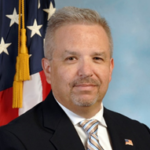INTERVIEW WITH FORMER FBI AGENT MICHAEL LEMIEUX:
How a Federal Agent Becomes an Enforcer and Advocate for Intellectual Property Rights Protection
Jacqueline Rodriguez
2021 Graduate, School of Criminal Justice, Michigan State University
Michael LeMieux is a retired FBI agent with over 20 years of law enforcement experience. At the end of his career, he was exposed to the world of intellectual property crimes while working at the National Intellectual Property Rights Center in Washington, D.C. At the beginning of his career, he worked with the U.S. Bureau of Indian Affairs (BIA) carrying out a family legacy of law enforcement.
In this following interview, I had the pleasure of spending time with Mike, asking general questions on his career and what he learned from his experience within the FBI. Give a warm welcome to Michael LeMieux!
Can you tell me a little bit about your career before you ended up working in intellectual property crimes?
My professional career is spread across 24 years of federal law enforcement followed by another five years (so far) in industry after my retirement from government. I began my federal law enforcement career as a Police Officer and Police Sergeant with the Bureau of Indian Affairs, Office of Law Enforcement Services, within the US Department of the Interior. This was a logical place for me to begin my federal law enforcement career, as both my father and grandfather were employed by BIA. I also gravitated to working in Indian Country because I am an enrolled tribal member with the Oneida Nation of Wisconsin and a descendent of the Red Cliff Band of Lake Superior Chippewa. After a handful of years at BIA, I was recruited into the FBI as a Special Agent and completed my training at Quantico, Virginia. During my career in the FBI, I specialized in investigations involving violent crime, domestic terrorism, public corruption, antitrust, and financial crimes. I was a founding coordinator of one of the first 17 Joint Terrorism Task Forces in the nation, managed the FBI’s Indian Country program, and was a national coordinator of the Federal Indian Gaming Working Group. I was also very fortunate during my career to serve as a supervisory instructor at the FBI Academy. All of these career experiences occurred well before my initial exposure to intellectual property rights but gave me some good foundation. My first “taste” of intellectual property rights (IPR) related issues occurred during my second Supervisory Special Agent assignment in the FBI, when I served as a Supervisory Special Agent (SSA)/Program Manager in the FBI’s IPR program at the National Intellectual Property Rights Coordination Center.
How valuable is getting prior experience in intellectual property to being successful in IP enforcement?
The most egregious infringers of intellectual property rights are not necessarily lone individuals out to make a quick buck. Instead, some of the most significant cases involve sophisticated criminal enterprises. This exposes a typical IP enforcement professional to a variety of other criminal violations, some parallel to the infringement and some in support of the illicit activity. These might include complex financial crimes to support their activities (e.g. money laundering or identity theft) or related criminal acts (e.g. drug or human trafficking). Having broad-based experience on criminal violations beyond the strict definitions of “IP enforcement” can be quite helpful to an IP professional.
Do you believe that if federal agencies, such as the FBI, were given more information on IP crimes, it would prioritize them higher?
The short answer is I don’t believe so.
The e-commerce environment was, to me, the “wild west” and one of the most challenging crime problems I’ve experienced during my career. I think anyone immersed in this field would note that the infringement issues are abundant and sometimes overwhelming. But there are simply not enough investigators, prosecutors, and criminal courts to support substantially greater numbers of cases on the criminal justice side. Instead, the majority of federal agencies follow strict prioritization of those cases to make sure the agency’s limited resources are spent on IPR violations that meet certain requirements. In the FBI, cases were a priority if they had a national security nexus, represented a significant health and safety risk to the consumer, or were somehow connected to other higher priority criminal violations. It was also critical that the agency and investigators were addressing matters that were likely to result in prosecution, so we worked closely with Department of Justice (DOJ) prosecutors.
Is there a case that has made a particular impact on your life? IP or otherwise? If so, why?
Like some law-enforcement professionals just starting their career, my early years were spent in uniformed policing. However, early on, I was also exposed to the work of conducting criminal investigations. I quickly found a high degree of satisfaction and felt as if this was a role where I could excel in my career. Long before my career in the FBI, I investigated a significant property crime ring in a community. Being involved in that kind of case early on was important, as it cemented my belief that this was what I needed to be doing for the rest of my career. I have always found investigative work to be an interesting blend between art and science.
What advice would you give someone who wants to explore the federal law enforcement field?
Like many other retired federal law enforcement professionals, I am always looking for good candidates to follow behind me into a great profession. One of the suggestions I often make to these prospective candidates is to develop a network of current and former law enforcement professionals so they are getting answers from those actually involved in the work. Law enforcement, and federal law enforcement specifically, is not always accurately represented in the media or entertainment. Therefore, I think it is vital for someone who believes they want to pursue this profession to seek the very best insight. These careers are not for everyone and candidates need to have the best understanding of the job and career long before they show up for the first day of training.
What do you wish everybody understood about your work related to IP?
Despite being a career federal investigator, the vast majority of my work is industry-centric and comes through those perspectives gained through my last five years of working outside of government. As a former federal agent, I am sometimes typecast into that law enforcement professional role. While I think my federal law enforcement career brings a unique perspective to my work within industry, it is certainly not the defining feature of my work in brand protection and intellectual property.
Would you change anything about your previous career experience in order to be more successful in the positions you have held?
There is always room for improvement. Whether it be on a counterfeit products investigation or some type of complex financial crimes investigation. The work of an investigator is something that continues to evolve throughout one’s career. If I had to identify one thing, it would be to secure as much advanced training in a topic as possible. For busy professionals, making time for advanced training is always difficult, but I think that can really benefit us in the long run. As much advanced training as I have had during my career, I think there will always be training opportunities that I wish I either had time for or decided to pursue.
What made you passionate about your career?
When asked to describe my professional persona, I would say, a problem solver, communicator, and organizer. My work as a federal law enforcement officer and investigator—and now as a consultant—embodies those three functions. It has been easy to continue the passion for my professional career because everything I do, and have done, is ultimately anchored in those three characteristics. For me, there is nothing more fun than solving a complex problem, searching for answers, and trying to keep the process and results organized in a way that they are useful.
What motivated(s) you to work hard?
: I think many people who enter the field of law enforcement are driven to make a difference and have an impact on the world around them. That inner drive is what makes us work hard and stay the course in what can be very challenging environments. During my career in the Bureau, I was always amazed at the wide variety of backgrounds among my fellow professionals. Name almost any profession and you can find an FBI Agent with that background in their former career, and what they did before they were one of the best at it. Internal motivation to be the best is a powerful force and makes “working hard” easy to do every day.
What life lesson did you learn the hard way?
One situation comes to mind and it concerns preparation. I was relatively new to my law enforcement career and was involved in a robbery investigation. My role was a relatively minor one but it concerned evidence collection during a search warrant. After the case proceeded to trial, I was called as a prosecution witness regarding that evidence collection. I considered pulling the evidence out to examine it again but got busy and didn’t do it. Like many others, I was busy juggling many other tasks. During testimony, I could not recall what a specific piece of evidence looked like and it resulted in a couple of “I can’t recall” statements on my part. Fortunately, the skilled prosecutor was able to rescue my testimony in the end but the whole episode was extremely unsettling. From there on, and for the rest of my career, I practiced meticulous preparation for any court proceedings regardless of the expected complexity or scale of those proceedings. It was a difficult lesson to learn but one that was ultimately very valuable for the rest of my career.
THE BRAND PROTECTION PROFESSIONAL | MARCH 2022 | VOLUME 7 NUMBER 1
2022 COPYRIGHT MICHIGAN STATE UNIVERSITY BOARD OF TRUSTEES


